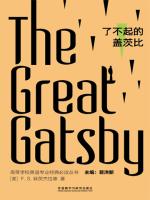The Green Light and
Xavier
The Green Light and the Illusion of the American Dream: A Review of The
Great Gatsby F. Scott Fitzgerald’s The Great Gatsby is not just a
story of love and loss—it is a haunting elegy for the shattered American
Dream, a glittering yet empty portrait of wealth, desire, and the cruel
gap between illusion and reality. Set against the roaring 1920s, a
decade of excess and moral emptiness, the novel follows Jay Gatsby, a
mysterious millionaire, and his relentless pursuit of Daisy Buchanan,
the woman he loved and lost years earlier. Narrated through the eyes of
Nick Carraway, Gatsby’s quiet, observant neighbor, the story unfolds
like a dream—bright, intoxicating, and ultimately devastating. Gatsby
himself is one of literature’s most tragic and compelling figures. He is
not just a wealthy man throwing lavish parties; he is a dreamer, a man
who has remade himself from poverty into opulence, all in the name of
winning back Daisy. His parties—with their endless champagne, dancing
crowds, and orchestras—are not celebrations, but desperate calls for
connection: he hopes Daisy will one day wander in, drawn by the noise.
Yet Gatsby remains an outsider, watching his own guests from a distance,
never truly belonging to the world he has created. What makes him tragic
is not his failure to win Daisy, but his refusal to see the truth: Daisy
is not the perfect, unattainable ideal he has spent years worshipping.
She is flawed—shallow, selfish, and bound to the privileged world of her
husband, Tom. Gatsby’s dream is built on a lie, and Fitzgerald makes us
feel the weight of that lie, even as we admire his courage to chase it.
Fitzgerald’s prose is luminous, blending beauty with a sharp,
undercurrent of sorrow. He paints the world of East Egg (old money) and
West Egg (new money) with vivid detail: the glittering Long Island
Sound, the endless rows of mansions, the empty chatter of Gatsby’s
guests. The green light at the end of Daisy’s dock—Gatsby’s constant,
silent obsession—becomes a powerful symbol of hope and longing, a
reminder of the dreams we reach for but never quite grasp. Yet beneath
the glamour lies rot: Tom’s violence and infidelity, Daisy’s
indifference to the suffering of others, and the casual cruelty of the
wealthy who treat people (like Gatsby, or Tom’s mistress, Myrtle) as
disposable. When Myrtle is killed in a car accident, and Tom and Daisy
simply leave town, leaving Gatsby to take the blame, Fitzgerald lays
bare the moral emptiness of their world: wealth protects them, while
dreamers like Gatsby are left to pay the price. What makes The Great
Gatsby timeless is its exploration of the American Dream’s dark side.
Gatsby embodies the idea that anyone can reinvent themselves, that
wealth and success can buy happiness—but Fitzgerald shows how that dream
is often hollow. Gatsby’s wealth brings him no joy; his parties are
empty; his love for Daisy is unrequited. The American Dream, Fitzgerald
suggests, is not a promise of fulfillment, but an illusion, a story we
tell ourselves to make sense of our desire for more. Nick, the narrator,
captures this sorrow perfectly when he reflects, “Gatsby believed in the
green light, the orgastic future that year by year recedes before us. It
eluded us then, but that’s no matter—tomorrow we will run faster,
stretch out our arms farther…” It is a line that resonates because it
speaks to a universal truth: we all chase dreams, even when we know they
may never come true. In the end, The Great Gatsby is a story about
loss—loss of love, loss of innocence, loss of the belief that hard work
and hope can fix everything. Gatsby’s death, alone in his pool, with no
one but Nick to mourn him, is a stark reminder of how easily we are
forgotten, how quickly our dreams fade. Yet the novel is not just a
tragedy; it is a warning. It warns us against confusing wealth with
worth, against building our lives on illusions, against treating others
as means to an end. The Great Gatsby is a short novel, but its impact
is enormous. It captures a moment in time—the excess of the 1920s—but
its themes are eternal. It asks us to look at our own dreams, to
question what we are chasing, and to wonder if the cost of that chase is
worth it. For anyone who has ever loved someone they couldn’t have, or
dreamed of a life they couldn’t achieve, Gatsby’s story feels personal.
It is a reminder that some dreams are meant to be chased, even if they
break us—and that the beauty of the dream often lies not in the
achieving, but in the trying.



 京公网安备 11010802032529号
京公网安备 11010802032529号